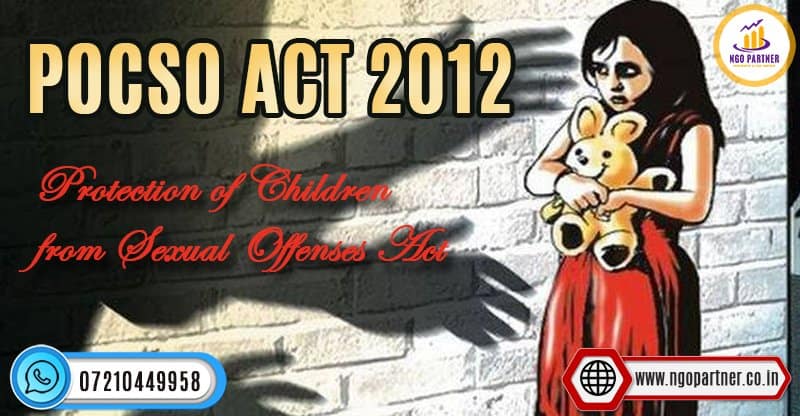
- June 17, 2023
- NGO Partner
- 0 Comments
- 791 Views
- 0 Likes
- Marketing Company Blogs
Protection of Children from Sexual Offences Act
What is POCSO Act?
The POCSO Act stands for the Protection of Children from Sexual Offences Act, 2012. It’s a comprehensive law in India designed to protect children from sexual assault, harassment, and pornography. Children are the most vulnerable members of our society, deserving utmost care, protection, and nurturing. However, incidents of child sexual abuse and exploitation continue to haunt our communities, necessitating strong legal measures to safeguard their innocence. One such crucial legislation in India is the Protection of Children from Sexual Offenses Act (POCSO), which plays a pivotal role in protecting children from the horrors of sexual offenses. In this blog post, we will delve into the history and significance of the POCSO Act, understanding its evolution and the crucial steps taken to protect children from sexual exploitation.

The POCSO Act holds immense significance in our society. It defines various forms of sexual offenses against children, sets clear penalties for offenders, and establishes special courts for speedy trials. It also emphasizes the importance of rehabilitation and support for survivors, with provisions for child-friendly procedures during legal proceedings. The Act plays a crucial role in raising awareness, preventing abuse, and creating a safer environment for our children.
Salient Features of the POCSO Act
The POCSO Act came into force in India in 2012, driven by the pressing need to address the growing incidents of child sexual abuse. The legislation was a response to the rising awareness of the alarming rates of such offenses and the need for a comprehensive legal framework to protect children. The Act recognizes the vulnerability of children and provides stringent provisions to ensure their safety, offering a legal recourse for survivors and a deterrent for offenders.
POCSO Act (2012)
- Protects children under 18: Applies to all genders below 18 years of age.
- Defines various offences: Sexually explicit acts, penetrative and non-penetrative assault, sexual harassment, and pornography involving a child are all criminal offenses.
- Stringent punishments: Prescribes strong penalties for perpetrators, with severity based on the offense and the child’s age. These can range from imprisonment to life sentences.
- Special Courts: Establishes dedicated Special Courts to expedite trials and verdicts in POCSO cases.
- Child-friendly procedures: Incorporates sensitive procedures for reporting, evidence collection, investigation, and trial to minimize trauma for child victims.
- Gender-neutral: The Act regards sexual offenses against a child as gender-neutral, ensuring protection for all children irrespective of their sex.
- Focus on best interests of the child: The Act prioritizes the well-being and best interests of the child throughout the legal process.
POCSO Act Amendment (2019)
- Enhanced punishments: Further strengthens penalties, including the death penalty for aggravated penetrative sexual assault on a child under 16.
- Wider definition of sexual assault: Expands the definition to include the administration of hormones or chemical substances to a child with the intent of achieving early sexual maturity for sexual assault.
- Focus on child pornography: Clearly defines child pornography and makes it a punishable offense.
- Special provisions for disabled children: Recognizes the particular vulnerability of disabled children and includes them under special protection measures.
Punishment for violation of POCSO Act
The Protection of Children from Sexual Offences (POCSO) Act, 2012, is a comprehensive law enacted in India to protect children from sexual abuse and exploitation. It covers various offenses and provides for stringent punishments. Here’s a list of some punishments under the POCSO Act:
- Penetrative Sexual Assault: Punishable with imprisonment not less than ten years, which may extend to life imprisonment, and fine.
- Aggravated Penetrative Sexual Assault: Punishable with rigorous imprisonment for a term which shall not be less than twenty years, but which may extend to life imprisonment, and fine.
- Sexual Assault: Punishable with imprisonment not less than three years but which may extend to five years, and fine.
- Aggravated Sexual Assault: Punishable with imprisonment not less than five years but which may extend to seven years, and fine.
- Sexual Harassment: Punishable with imprisonment of either description for a term which may extend to three years and shall also be liable to fine.
- Use of Child for Pornographic Purposes: Punishable with imprisonment which may extend to five years, and fine.
- Publishing or Transmitting Obscene Material: Punishable with imprisonment which may extend to three years and shall also be liable to fine.
- Child Pornography: Punishable with imprisonment which may extend to three years, and fine.
Where and how to report?
If you suspect child sexual abuse in India, it’s crucial to report it immediately. Here are two main ways to report:
- Dial 100: This is the national emergency number in India. Inform them about the suspected child sexual abuse and provide as much detail as possible.
- Nearest Police Station: You can visit your nearest police station and file a First Information Report (FIR).
- Special Juvenile Police Unit (SJPU): Many police stations have SJPUs dedicated to handling cases involving children. You can inquire about this option at the station.
- Dial 1098: This is a toll-free helpline specifically for children in distress. You can report suspected child sexual abuse anonymously.
- Online Complaint: You can also file a complaint online through the Childline website: https://www.childlineindia.org/
- Protection of the Child: The priority is the child’s safety. If you believe the child is in immediate danger, call the police first (dial 100).
- Details: Provide as much detail as possible during the report, including the child’s age, the nature of the abuse (if known), and any suspects.
- Identity: You can choose to report anonymously, especially through Childline 1098.
- Support: Reporting child sexual abuse can be emotionally difficult. There are resources available to help you and the child. You can seek guidance from the police or Childline about support services.
Related: Child Marriage Restraint Act
POCSO penalties vary based on the offense and victim’s age. Expect minimum 3 years to life imprisonment, with fines or even the death penalty for aggravated cases.
The POCSO Act protects anyone under 18 years old. It ensures anyone below 18 is considered a child and safeguards them from sexual offenses.
Section 12 of the POCSO Act, 2012 deals with the punishment for sexual harassment of a child. Here’s a breakdown:
- Offense: Whoever commits sexual harassment upon a child shall be punished.
- Punishment: Imprisonment of either description for a term which may extend to three years and shall also be liable to fine.




Leave a Comment